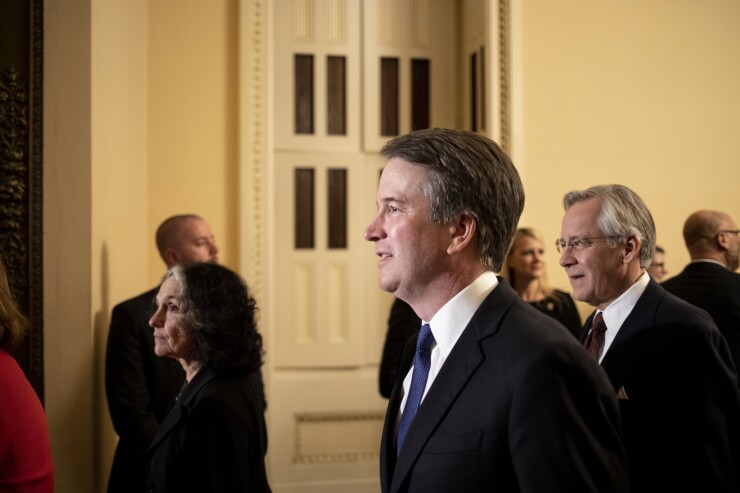A Supreme Court review of the Consumer Financial Protection Bureau's leadership structure looks even more likely now that the Department of Justice and the agency's own director
The ramifications of a CFPB constitutionality case reaching the high court could go far beyond the bureau. A ruling knocking down the single-director leadership framework could affect other agencies with a similar setup, such as the Federal Housing Finance Agency.
But how a CFPB case would play out is still unclear. The Supreme Court's 5-4 conservative majority suggests a leaning toward making it easier for a president to fire a sitting CFPB director. Yet with Chief Justice John Roberts emerging as a swing vote, some observers believe the court could go either way.
Legal experts have also opined on whether the court would just the punt the issue back to Congress, or take the more extreme route of ruling the CFPB as a whole — not just its leadership structure — as unconstitutional.
The Supreme Court will decide as early as next month — when it announces its docket for the upcoming term — whether to accept a case in which a California law firm claimed it was not required to respond to a CFPB civil investigative demand because the bureau is unconstitutional. If the Supreme Court accepts the case, CFPB v. Selia Law, a potential decision could come as early as next summer, before the presidential election.

Supreme Court Justice Brett Kavanaugh and the conservative majority are interested in cases involving
“My estimate is the Supreme Court will take the case,” said Richard Cordray, the former CFPB director. “They don’t have to but my sense is that Justice Kavanaugh will be eager to take it up because he’s already written a 101-page decision on the issue and he and Justice [Neil] Gorsuch are particularly interested in issues that bear on the powers of the administrative state.”
Here are various scenarios for how a Supreme Court challenge could play out.
Court upholds the CFPB’s constitutionality
At issue is whether Congress, in creating the CFPB under the Dodd-Frank Act, infringed on the authority of the president by creating a single-director structure that concentrates too much power in the head of an agency.
Last week, Kraninger told congressional leaders and CFPB staff that she backs a challenge to her own power after the Justice Department reversed itself in a brief asking the Supreme Court to take the Selia case.
The U.S. Court of Appeals for the D.C. Circuit
More than 20 agencies including the FTC, Federal Reserve, Federal Housing Finance Agency and Social Security Administration have statutes that protect appointees from removal except in cases of “inefficiency, neglect of duty, or malfeasance in office.”
Up to now, lower courts have upheld the provision in Dodd-Frank saying that a president can fire a CFPB director only "for cause."
Moreover, no recent President has attempted to remove the head of an independent agency for cause, said Kirti Datla, a senior associate at the law firm Hogan Lovells.
“The Supreme Court has already held that a certain amount of removal protection is acceptable with separation of powers, and this agency is no different in fact or theory from what the Supreme Court has held before,” Datla said.
Court strikes the "for cause” provision
But many watchers believe a more likely outcome is the Supreme Court striking the so-called “for cause” provision in Dodd Frank, because of the court's conservative majority.
When Kavanaugh was on the U.S. Court of Appeals for the D.C. Circuit, he suggested the CFPB director should be removable at will. Kavanaugh famously wrote in a lower-court opinion that the advent of independent regulatory agencies poses a threat unless powers are checked.
“To prevent tyranny and protect individual liberty, the Framers of the Constitution separated the legislative, executive, and judicial powers of the new national government,” Kavanaugh wrote. “The independent agencies collectively constitute, in effect, a headless fourth branch of the U.S. Government … [that poses] a significant threat to individual liberty and to the constitutional system of separation of powers and checks and balances.”
Kavanaugh found that the remedy was to simply strike the for-cause provision. If the Supreme Court issued a ruling to that effect, it could also call on Congress to improve the structure of the CFPB.
The justices pass on hearing the case
Disagreement among lower courts about the CFPB's constitutionality, the DOJ's brief and Kraninger's comments
The court
The end of the CFPB as we know it?
Some legal appeals challenging the constitutionality of the CFPB's leadership structure argue that the statute creating the agency should be thrown out — and the agency with it.
Yet legal scholars say the chances of the Supreme Court going any further than the single-director structure are remote. Dodd Frank included a "severability clause" stating that if one provision were found unconstitutional, the rest of the act would remain intact.
“We can rest assured that either the director is removable at will or removable for cause, and because of the severability clause the court’s review will be limited to that, without threatening the continued existence of the CFPB,” Cordray said.
Leah Litman, an assistant law professor at the University of Michigan, agreed, saying: "There is a severability clause so it means it is unlikely that the court will say the rest of Dodd-Frank is invalid — but stranger things have happened."
She added: "It’s extremely unlikely that they would do that.”





